Robert Mitchum’s Harry Powell is a murderous evangelical who stalks through Night of the Hunter muttering about love and hate, which are tattooed on his knuckles.
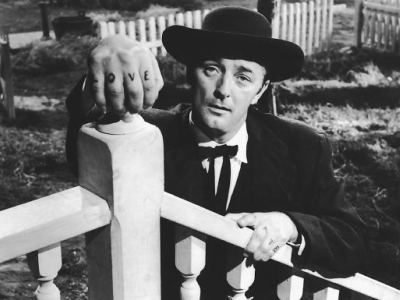 Powell:
Powell:
Lord, I am tired.
Sometimes I wonder if you really understand. Not that You mind the killin’s.
Yore Book is full of killin’s. But there are things you do hate
Lord: perfume-smellin’ things, lacy things, things with curly hair.
John Currin: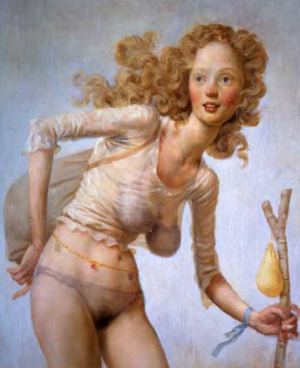 Currin is our Fragonard. For rougher trade, go to Grant Barnhart and scroll till you get to Midnight Special, 100 percent not safe for work.
Currin is our Fragonard. For rougher trade, go to Grant Barnhart and scroll till you get to Midnight Special, 100 percent not safe for work.
Marcus Martenson contemplates the problem of good and evil by looking at his feet (Good and bad clog).

Robert Frost wanted to dispense with thinking in elementary binaries:
It was by having been contrasted
That good and bad so long had lasted.
But he couldn’t help doing it:
When I was young my teachers were the old.
I gave up fire for form till I was cold.
Yeats, mired in Irish politics, was sick of right and wrong:
The best lack all conviction, while the worst
Are full of passionate intensity.
Currin is sick of them too, but from the catbird’s seat of aesthetics. Life is short, he
says, why not have fun? From Glenn O’Brien’s interview, via Two Coats of Paint:
CURRIN:
Another big realization for me was: Just don’t do things that depress
you. I realized if it depresses me, then I just don’t want to get close
to it. If it brings me down, I just really can’t get into it. I think a
big problem with art school is that it makes people feel like they have
to be interested in everything that’s of high quality.O’BRIEN: Yeah.
CURRIN: Donald Judd’s work is high quality, but it depresses
me. And so immediately I could just say, “I don’t have to worry about
Donald Judd now.” [laughs] It’s great. And I think a lot of people take
a more scholarly approach where they feel like you’re supposed to study
things that depress you.O’BRIEN: Yeah.
CURRIN: But I think there’s not enough time to be interested in
those things. And there’s so much that doesn’t depress me. There are
aspects of repetition that also depress me. Seriality depresses me.
Performance depresses me. Lack of narrative depresses me. All those
kinds of cool things bring me down. So that was an important
development for me, just realizing that you need to follow your
pleasure, at least as a painter. I think any kind of artist needs to,
no matter what you’re doing.
Currin’s a dandy with
brains, more Oscar Wilde than Wilde himself. Americans are good at
wishing away what we don’t want to see. Iraq? Are we still in Iraq?
Essential video from the present here.
More force and grace from Seattle includes:
Michael Spafford, from his Cronus Series, eating his children, after Goya:
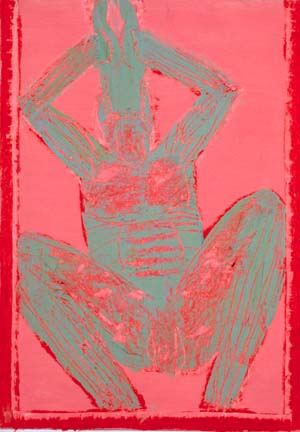 Anne Mathern, West (St. John in the wilderness)
Anne Mathern, West (St. John in the wilderness)
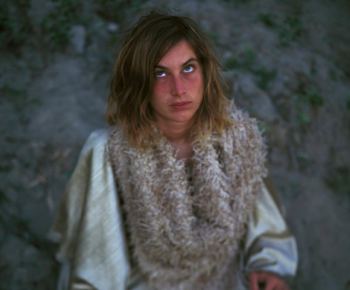 Grant Barnhart again, Two Road Agents Meet At An Impasse
Grant Barnhart again, Two Road Agents Meet At An Impasse
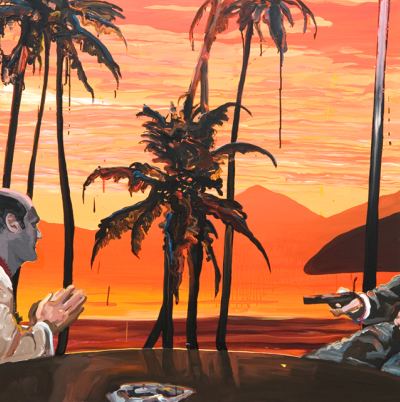
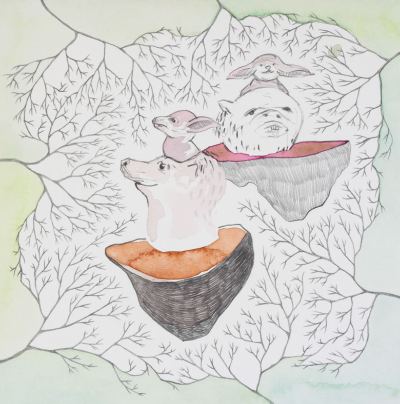 Then there’s Alice Wheeler. Can a bad brother get a break? (She’s in the front gallery at Greg Kucera till Aug. 15.)
Then there’s Alice Wheeler. Can a bad brother get a break? (She’s in the front gallery at Greg Kucera till Aug. 15.)
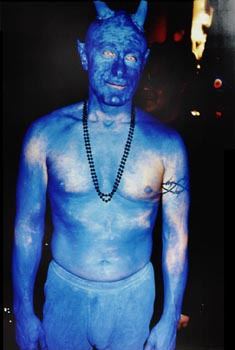



Superior composition masks phony rancidity of “subject matter.” The paintings internal contradictions make it look like second-rate Paul Cadmus (an oxymoron admittedly.) The tip offs to the painting’s mediocrity are its 1) bloodlessness and 2) lack of observation (of any kind, including sociological.) And the generation of critics who claim to have no interest in technical virtuosity for its own sake embrace him ENTIRELY for his skill. At his best, he’s a satirical illustrator of a high order.